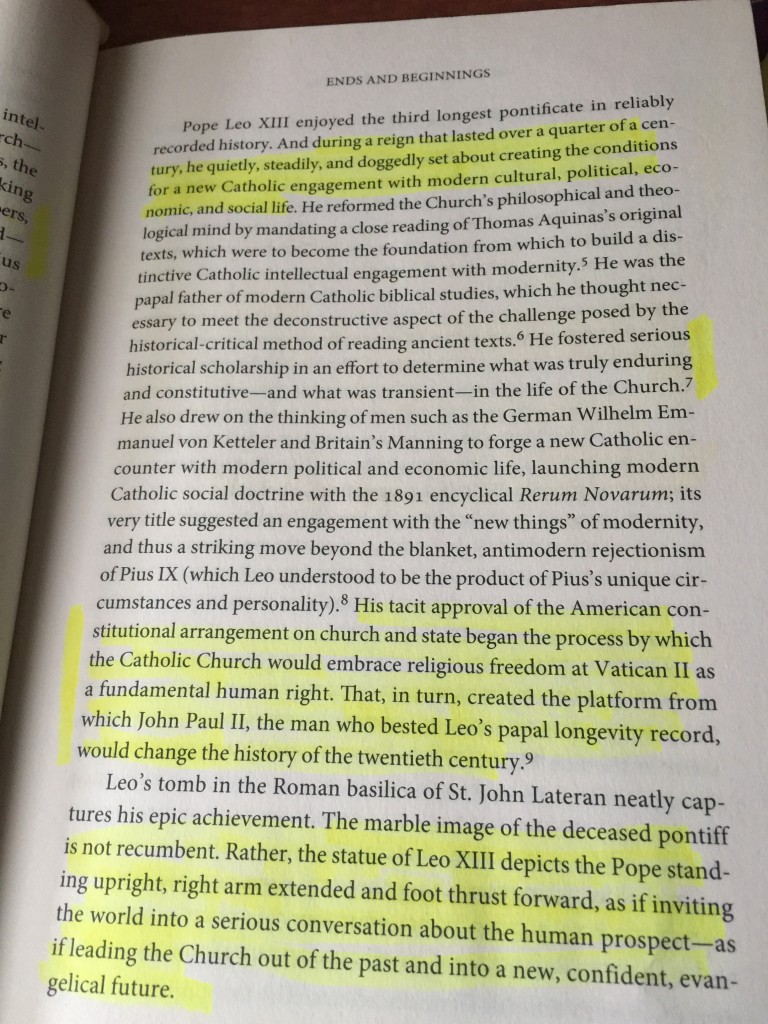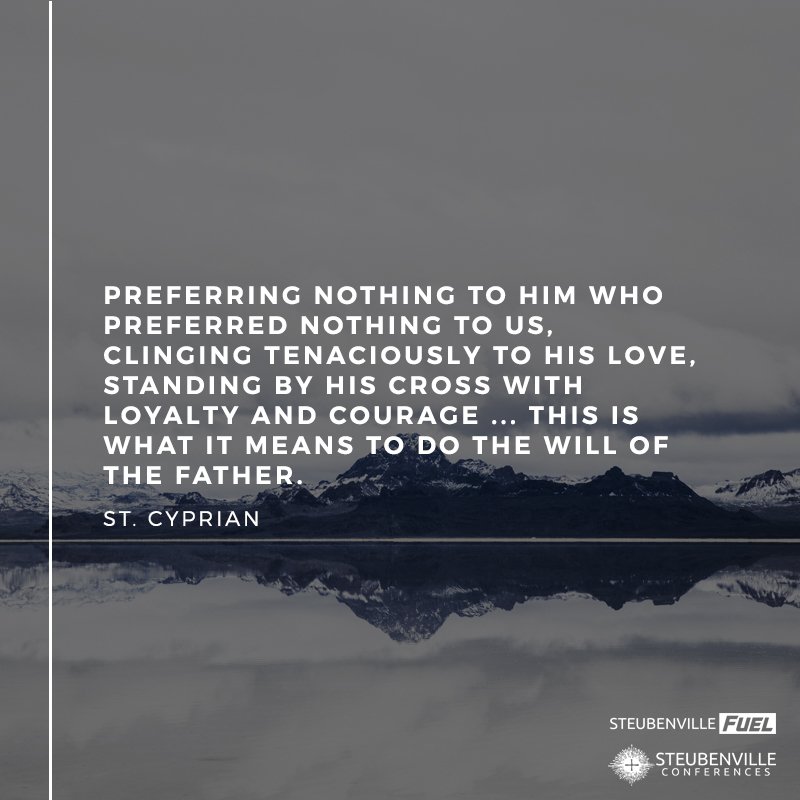1.
"Virtue is nothing without the trial of temptation, for there is no conflict without an enemy, no victory without strife." St. Leo the Great
— Fr. David Esquiliano (@Padre_DavidE) November 10, 2015
2.
Happy Feast Day, Pope St. Leo the Great! pic.twitter.com/39jDy17KB1
— USCCB Marriage (@MUR_USCCB) November 10, 2015
3.
S. Leo the Great pray for us pray for the Church. "Great" because of his love for God and his desire to serve and not be served.
— Bishop David Kagan (@VescovoDDK) November 10, 2015
4. As we begin to prepare for Advent, his great Christmas sermon: Christian, Remember Your Dignity!
5.
'The faith by which we live shall never vary … for one is the faith which sanctifies the just of all ages.' ~Pope St. Leo the Great #feast
— N. Catholic Register (@NCRegister) November 10, 2015
6. From the Liturgy of the Hours today, from one of Pope Leo’s sermons:
Although the universal Church of God is constituted of distinct orders of members, still, in spite of the many parts of its holy body, the Church subsists as an integral whole, just as the Apostle says: We are all one in Christ, nor is anyone separated from the office of another in such a way that a lower group has no connection with the head. In the unity of faith and baptism, our community is then undivided. There is a common dignity as the apostle Peter says in these words: And you are built up as living stones into spiritual houses, a holy priesthood, offering spiritual sacrifices which are acceptable to God through Jesus Christ. And again: But you are a chosen people, a royal priesthood, a holy nation, a people of election.
For all, regenerated in Christ, are made kings by the sign of the cross; they are consecrated priests by the oil of the Holy Spirit, so that beyond the special service of our ministry as priests, all spiritual and mature Christians know that they are a royal race and are sharers in the office of the priesthood. For what is more king-like than to find yourself ruler over your body after having surrendered your soul to God? And what is more priestly than to promise the Lord a pure conscience and to offer him in love unblemished victims on the altar of one’s heart?
Because, through the grace of God, it is a deed accomplished universally on behalf of all, it is altogether praiseworthy and in keeping with a religious attitude for you to rejoice in this our day of consecration, to consider it a day when we are especially honored. For indeed one sacramental priesthood is celebrated throughout the entire body of the Church. The oil which consecrates us has richer effects in the higher grades, yet it is not sparingly given in the lower.
Sharing in this office, my dear brethren, we have solid ground for a common rejoicing; yet there will be more genuine and excellent reason for joy if you do not dwell on the thought of our unworthiness. It is more helpful and more suitable to turn your thoughts to study the glory of the blessed apostle Peter. We should celebrate this day above all in honor of him. He overflowed with abundant riches from the very source of all graces, yet though he alone received much, nothing was given over to him without his sharing it. The Word made flesh lived among us, and in redeeming the whole human race, Christ gave himself entirely.
He reminds me: Have you prayed for priests today? Kathleen Beckmann talks about why it’s so important to here.
7.
Happy Feast of Pope St. Leo the Great @LawrenceOP https://t.co/TksZfHPCYa
— OPVocations (@OPVocations) November 10, 2015
8. Pope Benedict said of him in 2008:
The times in which Pope Leo lived were very difficult: constant barbarian invasions, the gradual weakening of imperial authority in the West and the long, drawn-out social crisis forced the Bishop of Rome – as was to happen even more obviously a century and a half later during the Pontificate of Gregory the Great — to play an important role in civil and political events. This, naturally, could only add to the importance and prestige of the Roman See. The fame of one particular episode in Leo’s life has endured. It dates back to 452 when the Pope, together with a Roman delegation, met Attila, chief of the Huns, in Mantua and dissuaded him from continuing the war of invasion by which he had already devastated the northeastern regions of Italy. Thus, he saved the rest of the Peninsula. This important event soon became memorable and lives on as an emblematic sign of the Pontiff’s action for peace. Unfortunately, the outcome of another Papal initiative three years later was not as successful, yet it was a sign of courage that still amazes us: in the spring of 455 Leo did not manage to prevent Genseric’s Vandals, who had reached the gates of Rome, from invading the undefended city that they plundered for two weeks. This gesture of the Pope — who, defenceless and surrounded by his clergy, went forth to meet the invader to implore him to desist – nevertheless prevented Rome from being burned and assured that the Basilicas of St Peter, St Paul and St John, in which part of the terrified population sought refuge, were spared.
We are familiar with Pope Leo’s action thanks to his most beautiful sermons – almost 100 in a splendid and clear Latin have been preserved – and thanks to his approximately 150 letters. In these texts the Pontiff appears in all his greatness, devoted to the service of truth in charity through an assiduous exercise of the Word which shows him to us as both Theologian and Pastor. Leo the Great, constantly thoughtful of his faithful and of the people of Rome but also of communion between the different Churches and of their needs, was a tireless champion and upholder of the Roman Primacy, presenting himself as the Apostle Peter’s authentic heir: the many Bishops who gathered at the Council of Chalcedon, the majority of whom came from the East, were well aware of this.
9.
Ceiling fresco from the Vatican Palace of today's Saint, Pope Leo the Great, defending Rome from Atilla the Hun
https://t.co/6aC8HVJuui
— Fr Lawrence Lew OP (@LawrenceOP) November 10, 2015
And:
Stained glass of Pope St Leo the Great whose feast is today. https://t.co/zXTd7unaVj
— Fr Lawrence Lew OP (@LawrenceOP) November 10, 2014
10. For kids.
11. A treasure trove of Leonine writings here.
12. A plug for the Catholic Information Center in Washington, D.C., and their wonderful Leonine fellows program:
13. In his Evangelical Catholicism, George Weigel writes about the pope of the day:
He goes on to say:
Viewed through this Leonine lens, Catholic history since Vatican II comes into a clearer focus than is possible when the viewing is done through the “progressive/conservative” prism that got set in analytic concrete during the Council. It is certainly true that, in the fifty-nine years between Leo’s deth in 1903 and the opening of Vatican II in 1962, various forces contended within the Church over the path into the future; some of those forces wanted to shore up the crumbling ramparts of Counter-Reformation Catholicism, while others were more sympathetic to the basic thrust of the Leonine renewal. But if one understands just how much of Vatican II’s teaching was made possible because of the ground broken by Leo XIII, then it becomes possible to “see” beneath the surface confusions and contentions of contemporary Catholic history. And at that deeper level of perception, it becomes clear that what happened at Vatican II, and in the Church’s efforts to implement its teaching faithfully, cannot be understood simplistically as a struggle for ecclesiastical power between a party of the Left and a party of the Right. More was happening and more was at stake—much more.
Seeing history this way may be important now more than ever. This right-left political reflex has got to go when it comes to the Church.
As George puts it elsewhere in the book: “[L]ukewarm Catholicism has no future; submitting to the transforming fire of the Holy Spirit is no longer optional.”
I interviewed him about Evangelical Catholicism when it came out here.
14. From Pope John XXIII’s encyclical on Leo: in the Church of Christ, if love is queen, no prince of darkness can prevail. “The devil’s works are then most effectually destroyed when men’s hearts are reunited in the love of God and the love of one another.” (71)
15.
“Our sharing in the Body and Blood of Christ has no other purpose than to transform us into that which we receive.” ~ Pope St. Leo the Great
— Fr. Jeff Cabral (@frjeffcabral) November 10, 2015
Saint Leo the Great, pray for us. And pray for Peter.













